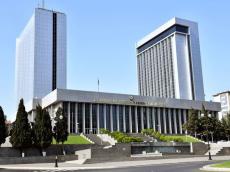|
|
TODAY.AZ / Politics
Initiative Group for Return to Western Azerbaijan issues statement
24 November 2024 [10:50] - TODAY.AZ

The Initiative Group for the Return to Western Azerbaijan of the Milli Majlis (Parliament) of Azerbaijan has issued a statement, Azernews reports.
The statement reads as follows:
"The attempt by Prime Minister of Armenia Nikol Pashinyan to draw a parallel between the question of Western Azerbaijan and the conception of the fictitious ‘Western Armenia’ concept is unacceptable.
The question of Western Azerbaijan is a topic of human rights, one which aims to serve a peaceful, secure and dignified return of the Azerbaijani people subjected to ethnic cleansing to Armenia. The words ‘Western Armenia’, on the other hand, represent a territorial claim that is enshrined in the Constitution and other key documents and political acts of Armenia.
In reality, the Prime Minister should have long ago at least called into question the very notion of ‘Western Armenia’ as well as made declarations about ‘the transition from the mythical Armenia to the real Armenia’. Still, this ought not to happen in prejudice to the right of the people of Western Azerbaijan, who were subjected to an ethnic cleansing, to return to their homes.
It is inadmissible to compare our rights activism with territorial claims. We once again remind that the Western Azerbaijan Community has repeatedly appealed to the Government of Armenia for a dialogue about the issue of the return of the people of Western Azerbaijan in full compliance with international law standards and principles, including those concerning territorial integrity and sovereignty of nations. However, Armenia not only disregarded those appeals but distorted the activities of the Community, calling it a threat to its territorial integrity.
Rather than making such erroneous comparisons, Prime Minister Pashinyan should respond to the appeals of the Community, ensure a safe and dignified return of the Western Azerbaijanis, start work on deleting territorial claims to Azerbaijan and the other neighbouring countries from Armenia’s Constitution and other documents immediately and unconditionally, and put an end to the hazardous militarisation policy."
URL: http://www.today.az/news/politics/255061.html
 Print version
Print version
Connect with us. Get latest news and updates.
See Also
- 04 April 2025 [14:34]
Azerbaijan, Russia mark 33rd anniversary of diplomatic ties with renewed commitment to alliance - 04 April 2025 [13:21]
Landmine toll reaches 388 in post-war Azerbaijan - 04 April 2025 [12:58]
Trial of Armenian-origin individuals accused of war crimes continues in Baku - 04 April 2025 [11:59]
Azerbaijan slams Armenia over unreliable landmine maps, urges international action - 04 April 2025 [11:35]
President Ilham Aliyev receives European Commissioner for Energy and Housing - 04 April 2025 [11:00]
April battles: the shame of the Armenian army and the triumph of Azerbaijan - 04 April 2025 [10:40]
Energy security is an integral part of national security: President - 04 April 2025 [10:33]
President Ilham Aliyev attends 11th Southern Gas Corridor Advisory Council Ministerial meeting and 3rd Green Energy Advisory Council Ministerial meeting - 04 April 2025 [10:10]
Underperformer strikes back - 03 April 2025 [15:18]
Armenian defendant admits role in war crimes during Baku Military Court trial
Most Popular
 Man with a "small brain" – Adam Schiff will not find it enough
Man with a "small brain" – Adam Schiff will not find it enough
 British MP honors Azerbaijani Genocide Day in Parliament on March 31st
British MP honors Azerbaijani Genocide Day in Parliament on March 31st
 Turkiye to introduce parental consent for social media users under age of 16
Turkiye to introduce parental consent for social media users under age of 16
 Aghdam’s Saricali village welcomes back displaced families
Aghdam’s Saricali village welcomes back displaced families
 Former Armenian military officials accused of negligence over Russian arms deal
Former Armenian military officials accused of negligence over Russian arms deal
 Bank of Japan warns of possible blow to global trade due to planned new US duties
Bank of Japan warns of possible blow to global trade due to planned new US duties
 Germany’s ambassador summoned over controversial Instagram post by German President
Germany’s ambassador summoned over controversial Instagram post by German President
